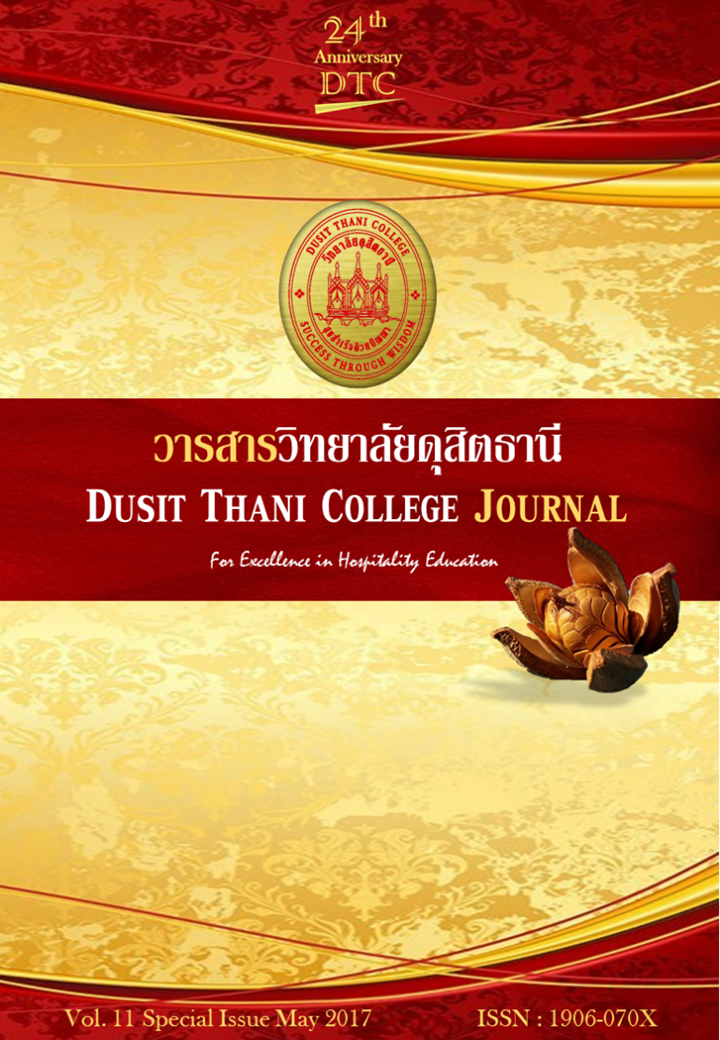เรื่องเล่าจากมัคคุเทศก์ไทยในสายอาชีพ
Main Article Content
บทคัดย่อ
การวิจัยครั้งนี้มีวัตถุประสงค์เพื่อศึกษาอาชีพของมัคคุเทศก์ในเมืองไทยที่ประสบความสำเร็จในอาชีพและการทำงานสู่อาชีพ กระบวนการในการทำงานปัญหาและอุปสรรคในการทำงาน ทัศนคติที่มีต่อการทำงาน ผู้ให้ข้อมูลหลักในการศึกษาครั้งนี้คือ มัคคุเทศก์ที่มีใบอนุญาตถูกต้องและได้รับรางวัลมาตรฐานมัคคุเทศก์ไทยจากกรมการท่องเที่ยวและรางวัลมัคคุเทศก์ดีเด่น จำนวน 3 ท่าน การวิจัยครั้งนี้ผู้วิจัยใช้การวิจัยเชิงคุณภาพโดยใช้วิธีการศึกษาประวัติและเรื่องเล่า โดยการสัมภาษณ์เชิงลึก ผลการวิจัยพบว่า มัคคุเทศก์ส่วนมากที่ทำงานในอาชีพมัคคุเทศก์ไม่ได้จบการศึกษาจากมหาวิทยาลัยโดยตรงในสาขาการท่องเที่ยว แต่มาจากมีความสนใจในงานด้านการนำเที่ยวการบริการ จึงได้เข้าร่วมอบรมหลักสูตรเพื่อขอใบอนุญาตมัคคุเทศก์และมีการฝึกฝนตนเองจากการเริ่มการฝึกงาน การทำงานเป็นผู้ช่วยมัคคุเทศก์มาก่อนและต่างก็มีใจรักในงานการบริการ มีความอดทนมองเห็นอนาคตในงานที่ตนเองรักและมีความคาดหวังที่จะประสบความสำเร็จในอาชีพนี้ได้ แม้ว่าการทำงานอาชีพนี้จะต้องพบกับปัญหาและอุปสรรคต่าง ๆ มากมายผู้ให้ข้อมูลก็ยังคงยึดหลักของการให้บริการที่มาจากใจและการทำงานแบบไม่หวังผลตอบแทน การทำงานประสบความสำเร็จในแต่ละครั้งคือความสุขของผู้มาใช้บริการและมีทัศนคติที่ดีต่อการทำงาน
Article Details
นโยบายการพิจารณากลั่นกรองบทความ
- บทความวิจัยและบทความวิชาการทุกเรื่องที่จะได้รับการตีพิมพ์ต้องผ่านการพิจารณากลั่นกรองโดยผู้ทรงคุณวุฒิ (Peer Review) ในสาขาที่เกี่ยวข้อง จำนวน 3 ท่าน/บทความ
- บทความ ข้อความ ภาพประกอบและตารางประกอบที่ลงตีพิมพ์ในวารสารเป็นความคิดเห็นส่วนตัวของผู้เขียน กองบรรณาธิการไม่จำเป็นต้องเห็นด้วยเสมอไป และไม่มีส่วนรับผิดชอบใด ๆ ถือเป็นความรับผิดชอบของผู้เขียนแต่เพียงผู้เดียว
- บทความที่จะได้รับการตีพิมพ์จะต้องไม่เคยตีพิมพ์ เผยแพร่ที่ใดมาก่อน และไม่อยู่ระหว่างการพิจารณาของวารสารฉบับอื่น หากตรวจสอบพบว่ามีการตีพิมพ์ซ้ำซ้อน ถือเป็นความรับผิดชอบของผู้เขียนแต่เพียงผู้เดียว
- บทความใดที่ผู้อ่านเห็นว่าได้มีการลอกเลียนหรือแอบอ้างโดยปราศจากการอ้างอิง หรือทำให้เข้าใจผิดว่าเป็นผลงานของผู้เขียน กรุณาแจ้งให้กองบรรณาธิการวารสารทราบจะเป็นพระคุณยิ่ง
เอกสารอ้างอิง
Luang District, Chiang Mai Province. Chiang Mai Press.
Department of Tourism. (2010). ASEANTourism Strategic Plan 2011-2015. Retrieved May
7, 2015, from http://www.tourismkm-asean.org/wp-content/pdf/plan AseanTourrism/Final_ASEAN_Tourism_Strategic-Plan_Thai_version.pdf.
__________. (2012). ASEAN Services Integration Report (2015). Retrieved May 7, 2014,
from ://newdot2.samartmultimedia.com/home/content.
__________. (2015). Visitors statistics 2015.from http://newdot2.samartmultimedia.com/home/details/11/221/25515.
__________. (2014). Registration Guide. Retrieved January 31, 2015, from
http://newdot2.samartmultimedia.com/home/content.
__________ . (2014). Tourism Business and Guide Act B.E. 2551 (2008) . Retrieved
2015, from http://www.tourism.go.th/subweb/content/6.home.
Sareerat, Siriwan. (1995). Consumer behavior. Bangkok. Pattana Press.
__________. (1998). Marketing strategy and marketing services. Bangkok: Theera Film &
Scitex Co.,Ltd.
Kotler (2003). Marketing management. New Jersey: Prentice-Hall.
Kultangvatana, Chaiyut (2003). Psychosocial factors related to moral behavior in service.
Guide of Thailand. Bangkok: The office of the National Research Council of Thailand (NRCT).
Na Ayudhya Theerakiti nawarat. (2004). Market for services: The concept strategy. Bangkok: Chula Press.
Nawatiwa, Ponthom. (2007). The desirable features of a guide to determine the rules
of standard Guide Case study Ubon Ratchathani. Ubon Ratchathani Uneversity Press.
Parasuraman, A., Zeithaml, V., & Berry, L. (1985). A conceptual model of service quality
and itsimplications for future research. Journal of Marketing, 49, 41-50.
Phothisita, Chai. (2007). Art and Science of Qualitative Research. Bangkok : Amarin Press.


